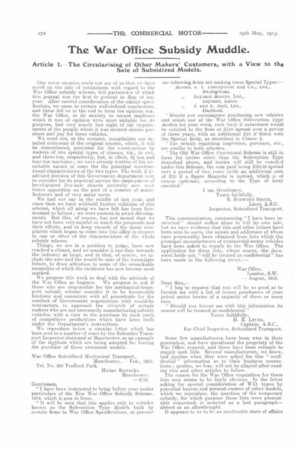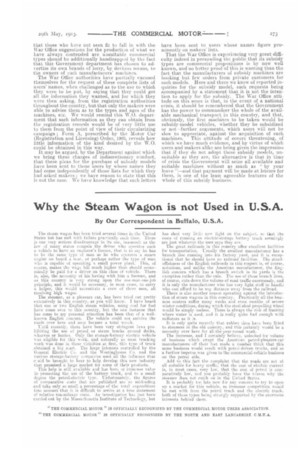The War Office Subsidy Muddle.
Page 4

Page 5

If you've noticed an error in this article please click here to report it so we can fix it.
Article 1. -The Circularising of Other Makers' Customers, with a View to the Sale of Subsidized iYiodels.
Our worst enemies could not say of us that we have erred on the side of enthusiasm with regard to the War Office subsidy scheme, full particulars of which this journal was the first to publish in May of ias year, After careful consideration of the official specification, we came to certain well-defined conclusions, and these led us in the end to form the opinion dm, the War Mice, in its anxiety to secure machines which it was of opinion were most suitable for its purpose, had very nearly lost sight of the requirements of the people whom it was desired should purchase and pay for these vehicles,
We need not, at the moment, recapitulate our detailed criticisms of the original scheme, which, it will be remembered, provided for the eonstiuction by makers of two special types of chassis, viz., u cwt. and three-ton, respectively, but, in effect, 2l ton and four-ton machines ; we. have already written of the unsuitable nature of some the the principal constructional characteristics of the two types. The bold, if ill advised decision of this Government department omy to consider for its practical service the employment of bevel-geared live-axle chassis naturally met wn Ii hitter opposition on the part of a number of manufacturers and of very many users.
We had our say in the middle of last year, and since then we have withheld further ctiticism of this scheme, which all along we have felt has been foredoomed to failure ; we were content to await developments. But this, of course, has not meant that we have not been very careful to watch the proposals and their effeets, and to keep records of the many complaints which began to come into this office in respect, to one or other of the characteristics of the whole subsidy scheme.
Things, we are in a position to judge, have now reached a climax, and we consider it our duty towards the industry at large, and in that, of course, we include the user and the would-be user of the immediate future, to draw attention to some of the remarkable anomalies of which the incidence has now become most marked.
We propose this week to deal with the attitude of the War Office as bagmen. We propose to ask if those who are responsible for the mechanical-transport, subsidy scheme consider it to be honourable business and consistentwith all precedents for the conduct of Government negotiations with would-be contractors, to approach the dientile of certain makers who are not necessarily manufacturing subsidy vehicles, with a view to the purchase by such users of competitive productions which have been built under the Department's instructions,
We reproduce below a circular letter which has been sentto a, number of users by the Subsidies Transport Inspector stationed at Manchester, as an example of the methods which are being adopted for forcing the purchase of these unwanted models.
War Office Subsidized Mechanical Transport, Manchester, — Feb., 1913. Tel. N"-o. 28 Trafford Park.
Hulme Barracks.
Manchester, —!2/13.
Gentlemen, " I have been instructed to bring before your notice particulars of the New War Office. Subsidy Scheme, 1912. which is now in force.
" It will be seen that this applies only to vehicles known as the Subvention Type Models built by certain firms to War Office Specifications, at present ine following hems are making these Special Types :— enessre. J. 1. 'iliornyerolt and. Co., Ltd., 1Sasingstoke.
Leyiand AloLors, Ltd., _Leyland, Lanes.
J. and L. nail, Ltd., Dartford.
Should you contemplate purchasing new vehicles and select. one of the War Office Sdbvention Type Alodels for your wora, suell lorry if subsidized would be entitled to the bum of Zile spread over a period of three years, with an additional £10 if fitted with the Special Body, as described in Clause 2.
" The details regarding inspection, purchase, etc., are similar to both schemes.
" The Old War Office Provisional Scheme is still in force for lorries other than the Subvention Type described above, and lorries will still be enrolled under this Scheme, the sum paid being 138/42 spread over a period of two years (with an additional sum of 110 if a Spare Magneto is carried, which is of course optional), according to the Type of lorry enrolled."
I am, Gentlemen.
Yours faithfully,
R. SNOWDEN SMITH,
Lieut, A.S,C.
Inspector, Subsidized Transport.
This communication, commencing "I have been instructed " should suffice alone to tell its own tale, but we have evidence that this and other letters have been sent to users, the names and addresses of whom have presumably been obtained from lists which the principal manufacturers of commercial-motor vehicles have been asked to supply to the War Office. The application for these lists, whose source, the document holds out, "will be treated as confidential" has been made in the following terms:— War Office, London, S.W. — August, 1912.
Dear Sirs,— " I beg to request that you will be so good as to furnish me with a list of recent purchasers of your petrol motor lorries of a capacity of three or more tons.
" Should you favour me with this information its source will be treated as confidential."
Yours faithfully,
H. R. LEVER,
Captain, A.S.C., For Chief Inspector, Subsidized Transport.
Some few manufacturers have been wise in their generation, and have questioned the propriety of the War Office request, and there have been refusals to supply such lists. Several manafakturers, we know, had qualms when they were asked for this " confidential " information as to their business connections ; qualms, we fear, will not be allayed after reading this and other articles to follow.
The reason for the War Office requisition for these lists now seems to be fairly obvious_ In the letter asking for special consideration of W.O. types by potential buyers and present owners of other models, which we reproduce, the question of the temporary subsidy, for which purpose those lists wore presumably requested, is inserted as a last, paragraph— almost as an afterthought.
It appears to us to be an intolerable state of affairs thatthose who have not seen fit to fall in with the War Office suggestions for the production of what we have always contended are unsuitable commercial types should be additionally handieapp,id by the fact that this Government department has chosen to advertise its own brands of lorry, by devious means, to the owners of such manufacturers' machines.
The War Office authorities have partially excused themselves for the request of these complete lists of users names, when challenged as to the use Co which they were to be put, by saying that they could get all the information they wanted, and for which they were then asking, from the registration authorities throughout the country, but that only the makers were able to advise them as to the types and ages of the machines, etc. We would remind this W.O. department that such information as they can obtain from the registration records would be of very little use to them from the point of view of their circularizing campaign ; Form A, prescribed by the Motor Car (Registration and Licensing) Order, 1903, reveals how little information of the kind desired by the W.O. could be obtained in this way.
It may be argued. by the Department against which we bring these charges of indiscretionary conduct, that these pleas for the purchase or subsidy models have been sent to those users by whose names they had come independently of those lists for which they had asked makers ; we have reason to state that this is not the case. We have knowledge that such letters have been sent to users whose names figure prominently on makers' lists. That the War Office is experiencing very great difficulty indeed in persuading the public that its subsidy types are commercial propositions i$ by now well known, and no better proof of this is wanting than the fact that the manufacturers of subsidy machines are hooking but few orders from private customers for such models. Here and there we know of reported inquiries for the subsidy model, such requests being accompanied by a statement that it is not the intention to apply for the sulisidy. The War Office attitude on this score is that, in the event of a national crisis, it should be remembered that the Government has the power to commandeer the whole of the available mechanical transport in this country, and that, obviously, the first machines to be taken would be subsidy-model vehicles, whether they be subsidized or not—further arguments, which users will not be slow to appreciate, against the acquisition of such machines. This attitude of covert threatening-, of which we have much evidence, and by virtue of whieh users and makers alike are being given the impression that if they do not adopt these subsidy models, unsuitable as they are, the alternative is that in time of .crisis the Government will seize all available and suitable machines without as much as by your leave "7—and that payment will be made at leisure for them, is one of the least agreeable features of the whole of this subsidy business.






























